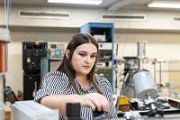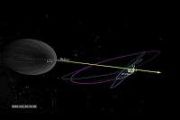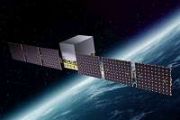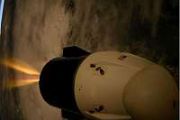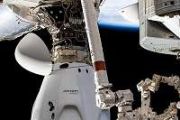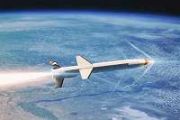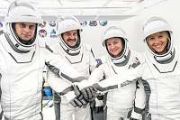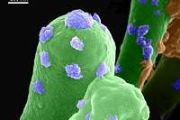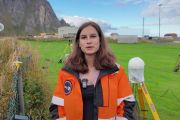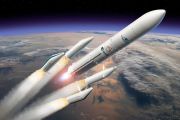
Copernical Team
Carbon monoxide from fires in Canada
 Image:
As climate change increases the risk of wildfires across the globe, the spate of fires that hit Canada in May and June suggest that 2023 is on course to be the country’s worst fire season to date. These fires not only
Image:
As climate change increases the risk of wildfires across the globe, the spate of fires that hit Canada in May and June suggest that 2023 is on course to be the country’s worst fire season to date. These fires not only Sun-watching Proba-3 formation flyers tested for take-off
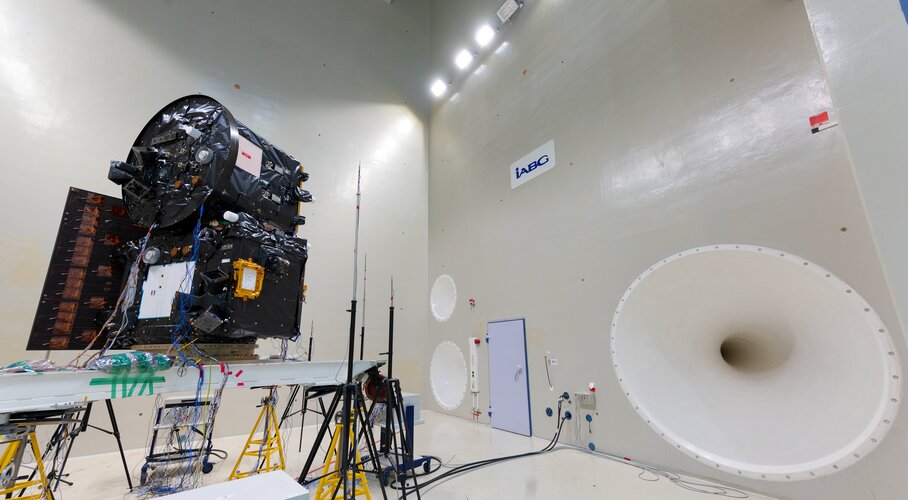
ESA’s pair of Sun-watching Proba-3 satellites have been placed in take-off configuration, one on top of the other, for testing in simulated launch and space conditions at IABG in Germany, ahead of their planned lift-off next year.
Gemini North detects multiple heavier elements in atmosphere of hot Exoplanet
 Astronomers using the Gemini North telescope, one half of the International Gemini Observatory operated by NSF's NOIRLab, have detected multiple rock-forming elements in the atmosphere of a Jupiter-sized exoplanet, WASP-76b. The planet is so perilously close to its host star that rock-forming elements - such as magnesium, calcium, and nickel - become vaporized and dispersed throughout its scorch
Astronomers using the Gemini North telescope, one half of the International Gemini Observatory operated by NSF's NOIRLab, have detected multiple rock-forming elements in the atmosphere of a Jupiter-sized exoplanet, WASP-76b. The planet is so perilously close to its host star that rock-forming elements - such as magnesium, calcium, and nickel - become vaporized and dispersed throughout its scorch DESI data sheds more light on 3D map of cosmos, study of universe
 Dr. Mustapha Ishak-Boushaki, a theoretical astrophysicist at The University of Texas at Dallas, has spent his career seeking answers to some of the universe's greatest mysteries, including why the expansion of the universe seems to be accelerating and whether gravity behaves differently beyond our closest cosmic neighbors.
To study these and other questions, a large collaboration of scient
Dr. Mustapha Ishak-Boushaki, a theoretical astrophysicist at The University of Texas at Dallas, has spent his career seeking answers to some of the universe's greatest mysteries, including why the expansion of the universe seems to be accelerating and whether gravity behaves differently beyond our closest cosmic neighbors.
To study these and other questions, a large collaboration of scient A Geologist in a Rock Shop: Sols 3859-3860
 It appears that Curiosity's recent traverse has turned a new leaf as this is the second successful drive after lots of slipping and sliding. The new workspace is full of goodies for us to target and fill our 2-sol plan with, in addition to new perspectives of features off in the distance. The rover passed the "Slip Risk Assessment Process" (SRAP) which means we can unstow the arm and use its ins
It appears that Curiosity's recent traverse has turned a new leaf as this is the second successful drive after lots of slipping and sliding. The new workspace is full of goodies for us to target and fill our 2-sol plan with, in addition to new perspectives of features off in the distance. The rover passed the "Slip Risk Assessment Process" (SRAP) which means we can unstow the arm and use its ins Scientists shed light on the unusual origin of a familiar meteor shower
 Each winter, the Geminid meteors light up the sky as they race past Earth, producing one of the most intense meteor showers in the night sky. Now, NASA's Parker Solar Probe mission is providing new evidence that a violent, catastrophic event created the Geminids.
Most meteor showers come from comets, which are made of ice and dust. When a comet travels close to the Sun, the ice evaporates
Each winter, the Geminid meteors light up the sky as they race past Earth, producing one of the most intense meteor showers in the night sky. Now, NASA's Parker Solar Probe mission is providing new evidence that a violent, catastrophic event created the Geminids.
Most meteor showers come from comets, which are made of ice and dust. When a comet travels close to the Sun, the ice evaporates It easier ever view Mars landscapes in high resolution
 There is a huge difference between looking at a photo of the Grand Canyon and seeing it in person. If you want to look at another planet's landscape, seeing it in person is not an option. That's why a team at the U.S. Geological Survey used supercomputers and cloud computing to process and release a treasure trove of ready-to-use Mars data: more than 4,800 digital terrain models, known as DTMs,
There is a huge difference between looking at a photo of the Grand Canyon and seeing it in person. If you want to look at another planet's landscape, seeing it in person is not an option. That's why a team at the U.S. Geological Survey used supercomputers and cloud computing to process and release a treasure trove of ready-to-use Mars data: more than 4,800 digital terrain models, known as DTMs, Astronomers discover new link between dark matter and clumpiness of the universe
 In a study published in the Journal of Cosmology and Astroparticle Physics, researchers at the University of Toronto reveal a theoretical breakthrough that may explain both the nature of invisible dark matter and the large-scale structure of the universe known as the cosmic web. The result establishes a new link between these two longstanding problems in astronomy, opening new possibilities for
In a study published in the Journal of Cosmology and Astroparticle Physics, researchers at the University of Toronto reveal a theoretical breakthrough that may explain both the nature of invisible dark matter and the large-scale structure of the universe known as the cosmic web. The result establishes a new link between these two longstanding problems in astronomy, opening new possibilities for Comtech, E-Space team up to make space-powered connectivity services available and actionable anywhere
 Comtech (NASDAQ: CMTL) and E-Space, the company bridging Earth and space to enable hyper-scaled deployments of Internet of Things (IoT) solutions and services, has announced a teaming agreement to collaborate, develop and deploy innovative space-based communications solutions and IoT services to support predominantly government and targeted commercial customers.
The collaboration will leve
Comtech (NASDAQ: CMTL) and E-Space, the company bridging Earth and space to enable hyper-scaled deployments of Internet of Things (IoT) solutions and services, has announced a teaming agreement to collaborate, develop and deploy innovative space-based communications solutions and IoT services to support predominantly government and targeted commercial customers.
The collaboration will leve ICEYE's four satellites launch with SpaceX's Transporter-8, introducing high-resolution spot fine image product
 ICEYE, the global leader in persistent monitoring with radar imaging satellites and an expert in natural catastrophe solutions, has successfully expanded its constellation with four new synthetic aperture radar ("SAR") satellites on June 12. The launch on SpaceX's Transporter-8 smallsat rideshare mission via Exolaunch was conducted from Vandenberg Space Force Base in California, USA. Each spacec
ICEYE, the global leader in persistent monitoring with radar imaging satellites and an expert in natural catastrophe solutions, has successfully expanded its constellation with four new synthetic aperture radar ("SAR") satellites on June 12. The launch on SpaceX's Transporter-8 smallsat rideshare mission via Exolaunch was conducted from Vandenberg Space Force Base in California, USA. Each spacec 


